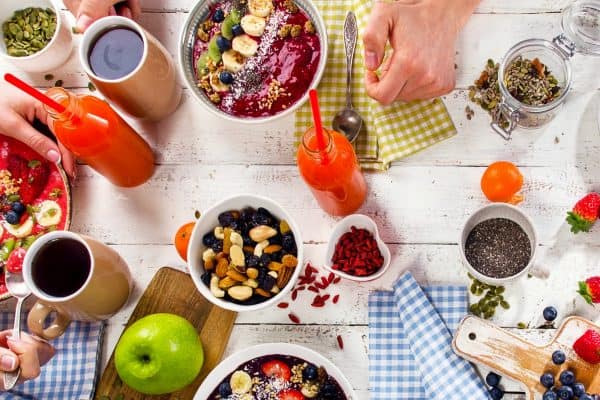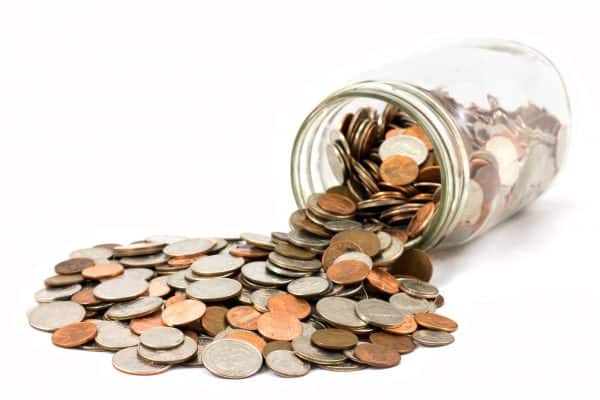There are many benefits to dropping meat from your diet, and they’re not limited to reducing animal cruelty. Eating less meat can be beneficial to your health, the environment, as well as your bank balance. To see just how far your purse could be positively affected by ditching life as a meat-eater, we’re having a look at how much cheaper it is to be a vegetarian.
How much money can you save by being vegetarian?
The answer to whether being vegetarian is cheaper is yes, but how much can you save? An Oxford University study found that sustainable and healthy diets, like vegetarian and vegan can reduce food costs by as much as 1/3. Even a flexitarian diet can cut food bills by 14%.
The savings from eating more sustainably come from swapping your meat with plant-based protein sources such as chickpeas, pulses, beans and lentils. Sometimes vegan and vegetarian meat substitutes can be just as expensive as meat products, so double-check when buying. But buying raw food such as fruit and vegetables are great options, you can always make a curry with potatoes instead of meat or meat alternative.
Related: Best Ways To Control Your Weekly Shopping Budget
And amidst the current cost-of-living crisis, many Britons are going vegetarian to save money according to The Independent. With prices rising, meat is becoming more of a luxury item as people cannot afford meat as often as they used to. Figures show that lamb sales are down 23.7%, fish by 11.6%, beef by 13.7%, pork by 10.6% and chicken by 9.7%. This is compared to the Vegetarian Society experiencing a surge of 50% increase in web traffic to their recipe pages. It seems like most people are introducing more vegetarian meals into their diet and cutting back on meat to save money in the current climate.
On America’s shores, a recent study published in the Journal of Hunger & Environmental Nutrition, focused on the direct impact of becoming vegetarian on our pockets. The researchers compared the US government’s recommended weekly meal plans – which contain meat- against a comparable seven-day plant-based meal plan, both of which contained a minimum of 50g of protien and totalled 2,000 calories per day.
Of the two diets, the vegetarian one was $750 cheaper than its carnivorous counterpart over a year, while also containing 25 more servings of vegetables, not including potatoes. This works out as a saving of roughly £565, which is more than the average cost of a flight to the Bahamas! The diet also contained 14 more servings of grains and eight more servings of fruit per week. If that’s not getting more bang for your buck, then we don’t know what is!
How to save money being vegetarian?
If you aren’t sure how to save money, try to get inspired by looking at recipes first. Then opt to substitute and swap the meat for veg or meat substitutes, those make it easier to have meals such as burgers, tacos or spaghetti just with the plant-based protein option. With a wide range of options in supermarkets, you can easily make the swap once a week or completely cut meat out for good.
Related: Budget-Friendly Easy Meals
Vegetarian and vegan meals in restaurants and takeouts are also great option to help you save money. By choosing veggie-based or plant-based protein substitutes, you can still enjoy your tasty favourites at a lower price. Often the price isn’t that much of a difference; however, every penny adds up in the end!
Does being vegetarian save the economy?
Being vegetarian doesn’t just affect yourwallet, but the economy too. A study published in the Proceedings of the National Academy of Sciences by Marco Springman and his colleagues at the University of Oxford compared the average meat-heavy diet common in the US to a vegetarian diet. The results show that following a vegetarian diet could save the US economy $258.1 billion, or £190.78 billion per year. If everyone in the world were to change their diets in this way, we could save around £1096.53 billion in one year alone, saving on health care and environmental costs.
Environmental benefits of eating less meat
While being vegetarian or vegan is cheaper and saves the economy money, there is a lot of other reasons people may choose to eat less meat or cut it out completely. These include saving carbon, the environment and animals.
Occasionally swapping meat or a plant-based meal can save carbon. But how much carbon can you save by being vegetarian? Carbon Footprint has a great calculator to show how it all adds up and how you can save and offset your emissions. Just choosing to dedicate 1 day to being vegetarian per week can save nearly 100 kgs of CO2 per year!
According to the Vegetarian Society, you can not only reduce your carbon, but save emissions equivalent to taking a small car of the road for 6 months, and even save the land and water. A vegetarian diet requires two and a half times less the amount of land to grow food compares to the agricultural land that cattle need. And that chicken breast you’re eating takes over 735 litres of water to produce!
Being vegetarian is beneficialfor animals as well as the planet. From the moral satisfaction of not eating animals to saving the planet by reducing habitat destruction and deforestation to use for more farmland, and helping climate change by being more eco-friendly. You’re also saving animals from the cruelty of the farming industry according to Animal Aid. By choosing to eat less meat you are cutting down the demand, you’ll save on average, 202 animals per year.
Being a healthy vegetarian
Going vegetarian can also improve your overall health by putting better nutrients in your body. By avoiding foods that are high in saturated fat such as red meat, vegetarian or vegan meals can help to lower blood pressure and cholesterol. As well, they are often lower in calories and made with less processed foods. But of course, this is all about eating balanced meals and making sure you’re still getting the nutrients you need.
Related: Easy Ingredients Swaps To Cut Cost, Not Nutrition
Those converting to vegetarianism are often concerned about drops in their iron levels, as red meat is the commonly believed to be the best source of this nutrient. However, this isn’t the case and it’s more than easy to fulfil your daily iron requirements by eating dark leafy vegetables such as broccoli and spinach and eating plenty of rice, wheat and oats.
Other important things to keep an eye out for include B12, Zinc, Vitamin D and Omega-3 fatty acids. It’s important to be aware of these nutrients though you’ll probably find you consume them quite naturally. These vitamins are all available in fortified cereals and soy products in particular. B12 is slightly harder to come across, so you may wish to take a supplement for this. Supplements aren’t for everyone, though, and if you’d rather find a way to get this in naturally, a bit of extra soya milk should do the trick.
Saving money by being vegetarian
Of course, there’s a lot of benefits to eating less meat, from great quality healthy food to the economic and environmental impacts. But in the current cost-of-living crisis or for those who are looking to be more budget-friendly, going vegetarian or embracing the flexitarian diet by including a few veggie meals into their diet you can save money on your food shops.
However, it’s still important to eat healthily and avoid opting for processed substitutes as a way of replacing meat in your diet. Some meat substitutes like ready-made meals can be unhealthy and shouldn’t be an everyday staple. Just make sure to maximse your cost savings and keep track of your spendings. For more tips on how to be money savvy, including food and budget living hacks, check out our Good Vibes blog.



















